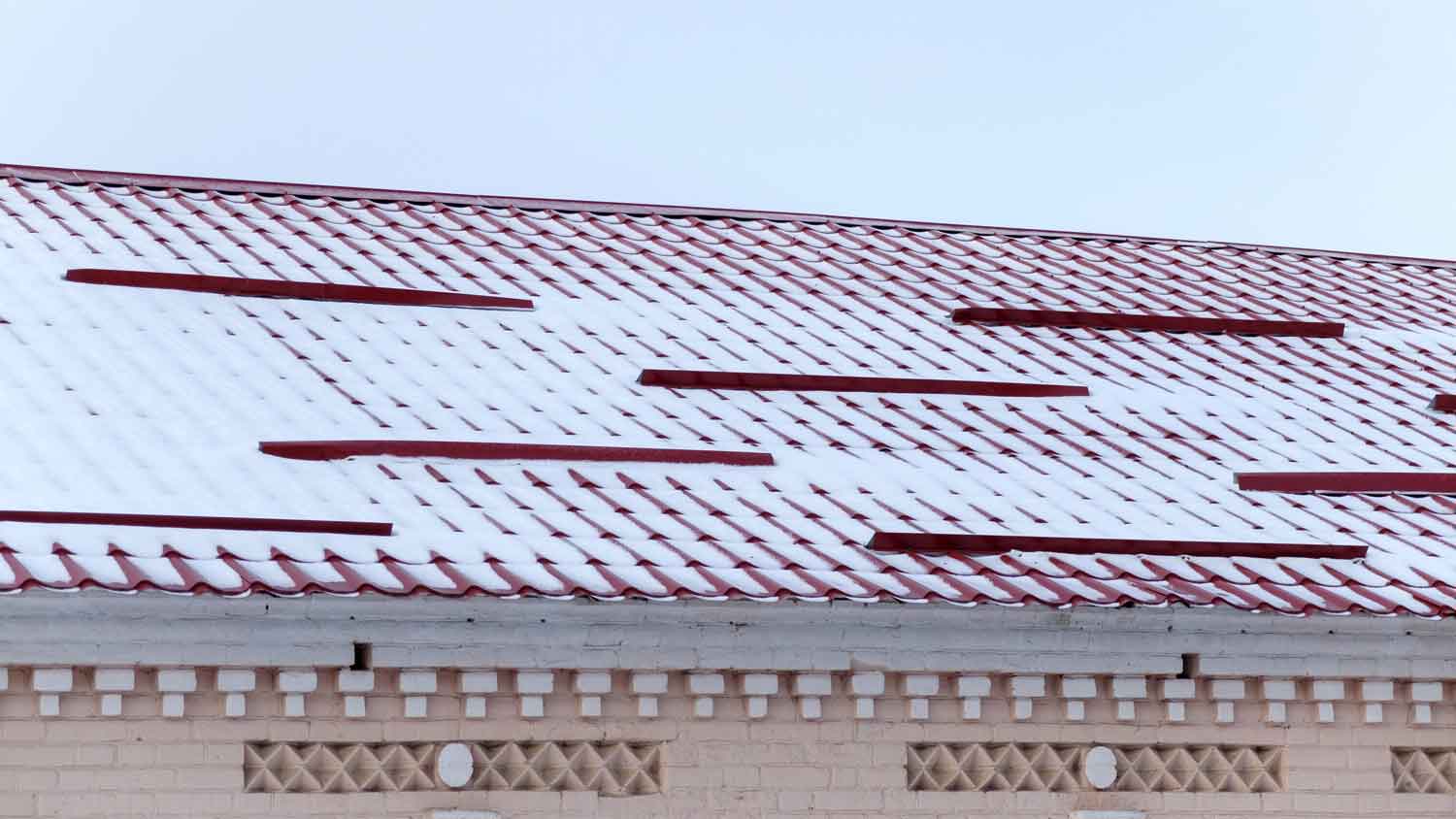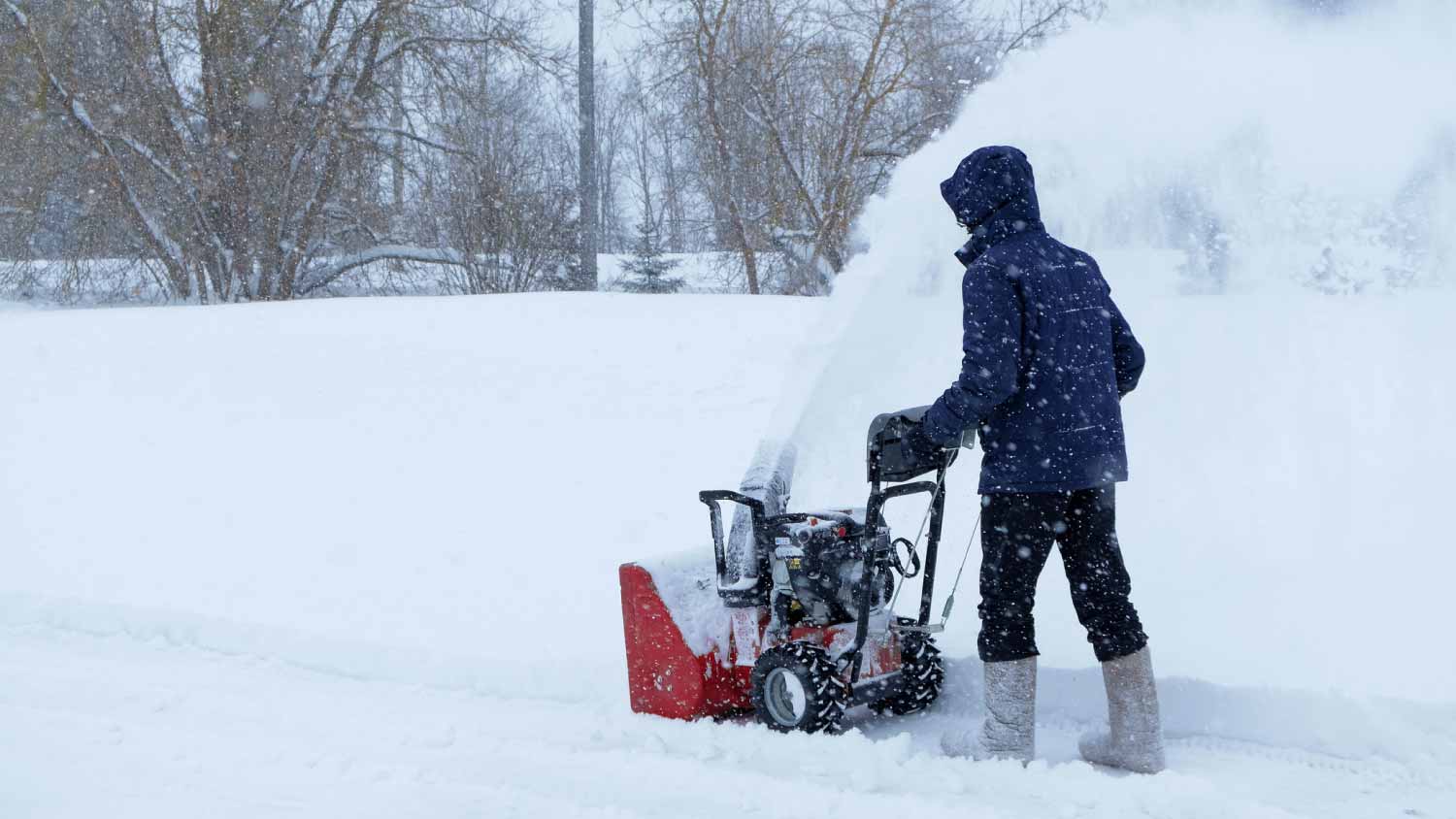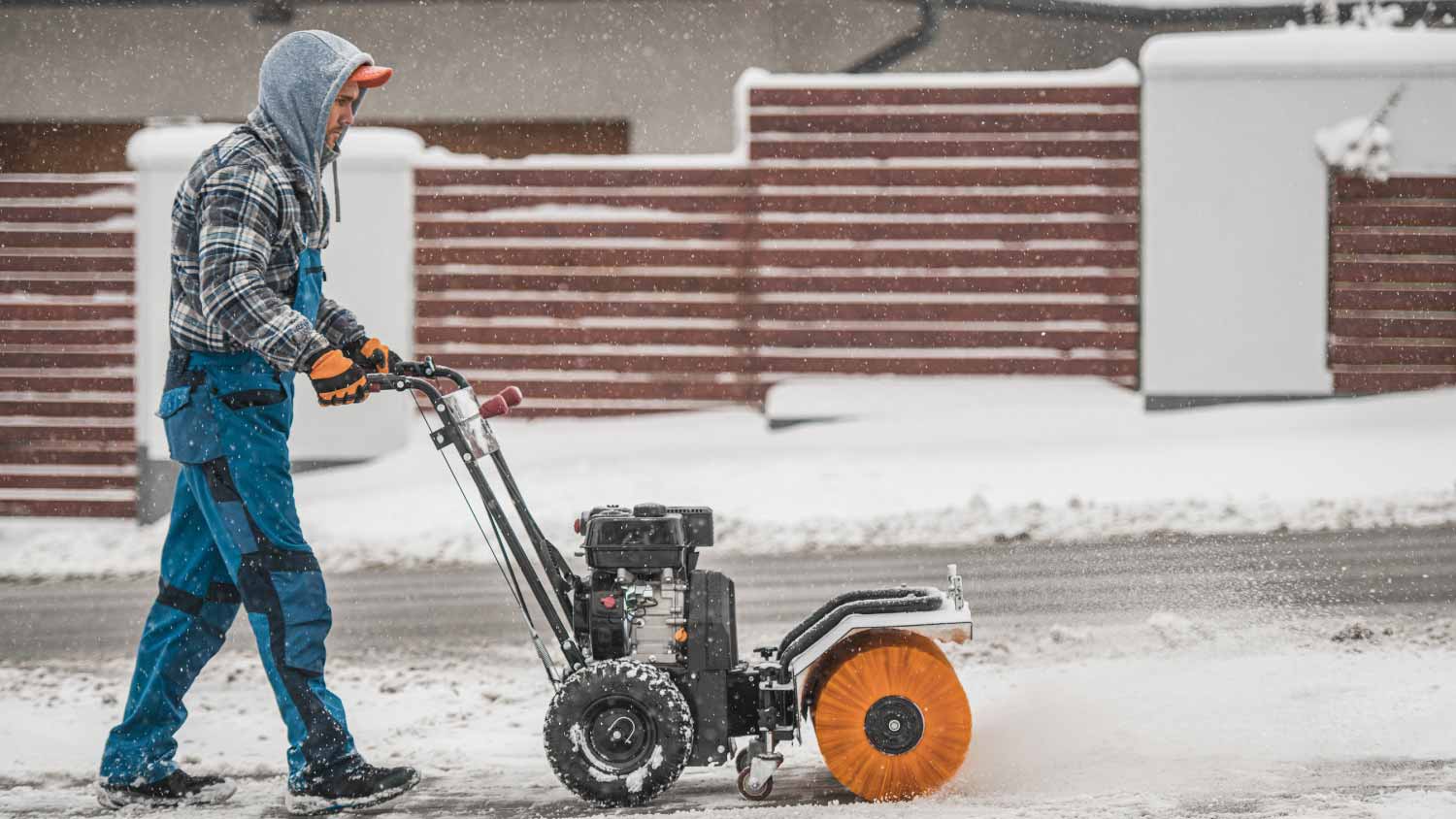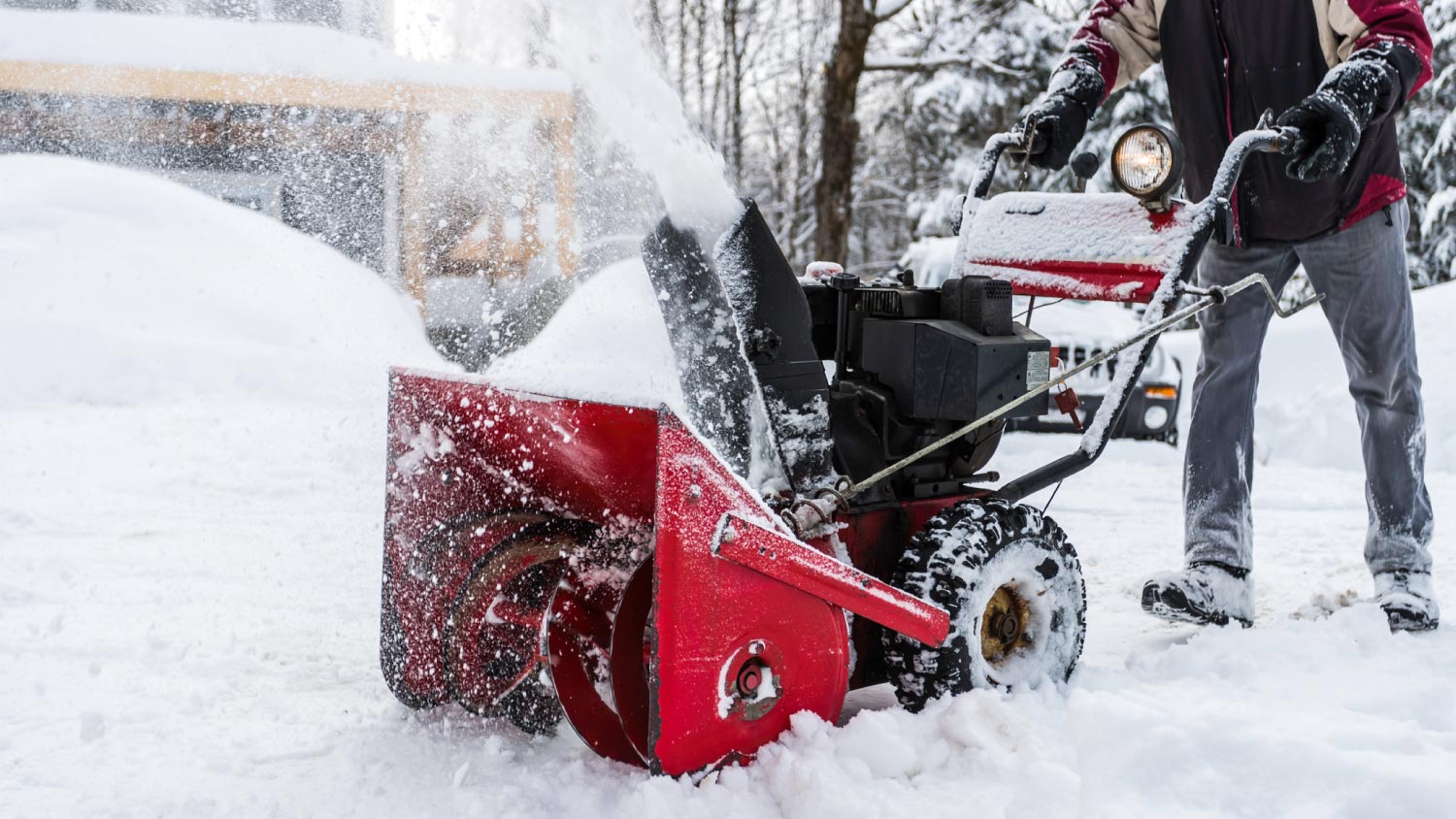
Discover the cost to install snow guards. Learn about average prices, key cost factors, and tips to save on your snow guard installation project.
Decide between these two tools for tackling snow


Snow blowers are more effective for removing heavy snow, while power brushes are best suited for removing light snow.
Snow blowers cover larger areas faster than power brushes.
Snow blowers are self-propelling, making them easier to use than power brushes despite their bulkier size.
It’s that time of year—holiday lights, nose-nipping frost, and the seemingly endless chore of snow removal. If you’re looking for an upgrade from your basic shovel, you might be considering a snow blower vs. power brush. So, which one is the superior snow removal tool? Let’s review the major differences to help you decide which will work best for your home.
Snow blowers are heavy-duty machines designed to clear large amounts of snow quickly by scooping it up and throwing it aside. In contrast, power brushes are lighter, more maneuverable tools that use rotating bristles to sweep away light snow and debris. These two types of snow removal equipment are useful for different applications: Snow throwers are ideal for large areas and heavy, frequent snowfall, while power brushes are best suited for small areas with light, powdery snow.

A snow blower is a machine that helps clear snow by collecting it through an auger and then propelling it out through a chute. It’s especially useful for clearing large driveways, sidewalks, and other expansive areas quickly and efficiently. Plus, with its self-propelling design, learning how to use a snowblower is simple despite its larger size.
| Pros | Cons |
|---|---|
| Clears heavy snow efficiently | Heavy and bulky |
| Saves time on large areas | Noisy |
| Self-propelling | Expensive |
Best for:
Homeowners with large driveways and walkways
Areas with heavy and frequent snowfall
Those seeking quick and efficient snow removal
The main advantage of snow blowers is their efficiency: Upgrading from a snow shovel versus a snow blower can save many hours and muscle strain, and snow blowers are more efficient than power brushes as well. Additionally, snow blowers can handle heavy, wet snow and cover larger areas than power brushes.
The disadvantages of snow blowers include their higher price tag and the demand for storage space due to their large size. Additionally, snow blowers can be more difficult to maneuver in tight spaces, and they may not be as effective for clearing small amounts of snow. Plus, some models can be noisy, which might be an issue in denser and more populated neighborhoods.

The power brush, sometimes called a snow sweeper, features a spinning round brush that effectively sweeps away snow. Equipped with sturdy wire and plastic bristles, the power brush effortlessly clears light, powdery snow, and small debris like dirt, gravel, and leaves. Its lightweight design enables easy maneuverability while ensuring thorough cleaning.
| Pros | Cons |
|---|---|
| Easy to maneuver | Not effective for heavy snow |
| Great for small areas | Bristles clog easily |
| Removes dirt, gravel, and small debris | Covers smaller areas at a time |
Best for:
Homeowners with small driveways or patios
Areas with light, infrequent snowfall
Homeowners needing a multipurpose cleaning tool
The advantages of power brushes include their lightweight and easy-to-use design. They are lighter and easier to handle than snow blowers, making them suitable for quick and frequent use. Their simple operation is user-friendly, even for people not familiar with power tools. Additionally, power brushes are versatile and can be used for various cleaning tasks throughout the year, such as sweeping away dirt, leaves, and other debris.
Power brushes have their limitations. For instance, they struggle with removing heavy, wet snow and aren't built to tackle large snowfalls. They work best with light, powdery snow. Additionally, they are most effective in smaller areas and might not be the best choice for clearing large driveways or extensive spaces, as it can be time-consuming. Using a power brush requires more physical effort than using a snow blower, especially when dealing with stubborn debris or compacted snow.
Here’s a side-by-side comparison to consider before deciding whether a snow blower or power brush will be the better fit for your needs.
When it comes to snow removal, the snow blower is the superior tool overall. Its ability to tackle large amounts of snow in a shorter amount of time makes it the more efficient option. Power brushes, on the other hand, can only handle light snow, often clogging and malfunctioning when snow is heavy or wet.
Along with removing light snow, a power brush can double as a basic sweeper for small debris, such as dirt, gravel, and leaves. This offers year-round utility beyond just snow removal.
While power brushes are smaller and lighter than snow blowers, the self-propelling design of a snow blower still makes them relatively easy to maneuver. Since snow blowers typically cover a wider range and remove heavier snow and debris, they come out on top in the user-friendliness category.
For clearing large areas rapidly, snow blowers are more efficient, significantly reducing the time and effort required compared to power brushes. Power brushes are also more likely to clog up when there’s wet or heavy snow.
In terms of cost, power brushes are typically less expensive, although prices vary widely for both power brushes and snow blowers. You can get a small electric snow blower for as little as $100, but three-stage models can cost $10,000 or more. Power brushes start at about $120, with high-end models reaching upwards of $7,000.
Snow blowers can be quite noisy, especially larger and more powerful models, which may pose a problem for those living in denser neighborhoods who might want to clear the snow during especially early or late hours. Power brushes do not operate quietly either, but they tend to be less noisy.
Power brushes are smaller and more compact, requiring less storage space compared to bulkier snow blowers. However, fuel storage is another thing to consider, particularly if you’re using a gas snow blower vs electric. Power brushes are usually gas-powered, meaning you’ll have to safely store additional gasoline; likewise if you’re using a gas-powered snow blower. On the other hand, an electric snow blower won’t require additional fuel storage, so it may demand less storage space overall.
From average costs to expert advice, get all the answers you need to get your job done.

Discover the cost to install snow guards. Learn about average prices, key cost factors, and tips to save on your snow guard installation project.

Get the latest snow removal cost estimates, including average prices, key cost factors, and tips to help homeowners budget for safe, efficient snow removal.

Snow throwers and snow blowers are often named interchangeably, but they aren’t the same. Learn the main differences between a snow thrower vs. snow blower.

Nothing ruins a good deck like ample and consistent build-up of snow and ice. Whether your outdoor deck features wood, composite material, or even PVC, here are steps to take to keep it safe and damage-free during those nasty winter months.

Use our guide to learn how to use a snowblower so that your driveway, sidewalk, and front entry are hazard-free throughout the winter.

Prepping and starting a snowblower properly is crucial for longevity and efficient operation. Find out how to start a snowblower.